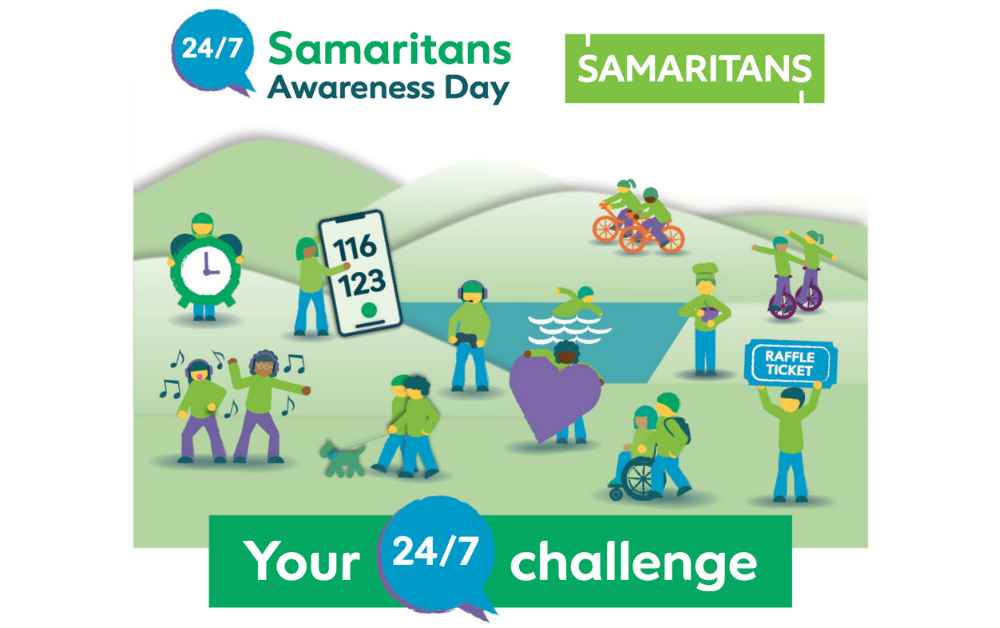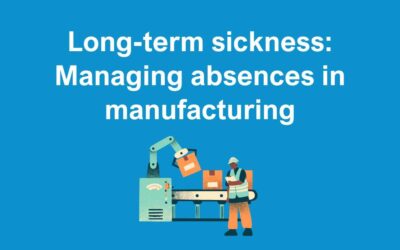Each year on 24 July, Samaritans hold their Awareness Day, also known as “The Big Listen” or “24/7 Awareness Day”, highlighting that their helpline is available 24 hours a day, 7 days a week for anyone who is struggling with their mental health in silence. They want to get the message out that: ”Samaritans is the charity that prevents suicide through the power of human connection.”
This is an opportunity as an employer to take suicide prevention seriously and inspire your staff to prioritise their mental health. Promoting mental health at work isn’t a tick-box exercise — it’s a vital, ongoing commitment.
Here are a few ideas from Samaritans on how to get Involved:
- Organise a 24-hour challenge to raise awareness of the 24-7 support that Samaritans provide people in need.
- Hold a charity day to raise money for Samaritans. This can be as simple as a bake sale or encouraging everyone to wear green and make a donation.
- Organise a listening quiz to remind everyone that listening saves lives. You can play music or clips from movies.
- Dedicate time in the day for everyone to enjoy a wellbeing walk. Getting some fresh air, exercising, and talking with others is great for wellbeing.
Find out more and download their toolkit on their website. They provide helpful information packs and promotional materials you can share on social media and in the workplace.
The Great Work That Samaritans Do
Every 10-seconds, Samaritans respond to a call for help. They are available 24 hours a day, 365 days a year to provide support to anyone who needs it. They also provide workplace support with:
- Training and engagement programmes
- Wellbeing online learning
- Rail Industry suicide prevention programme
- Wellbeing in retail
- Our Frontline support providing frontline workers with the help they need.
You can find out more on their website.
How to Support your Employees’ Mental Health
There are many ways to improve wellbeing in the workplace. Here’s our top tips
Emphasise the importance of breaks:
It’s important to remind your employees to take their breaks. Encourage them to step away from their work station for a coffee break or to take a walk outdoors during lunch time. This can help them to clear their mind. If you have employees who work from home, stress the importance of taking a break. It can be easy just to work through however, it’s not good for mental health or productivity.
Promote Daily Exercise
One valuable lesson we learned from the Covid-19 lockdown was the importance of daily exercise in enhancing overall wellbeing. Encourage your employees to incorporate physical activity into their daily routines. This can be as simple as taking a daily walk or, if feasible, offering them access to free online fitness classes that they can participate in from the comfort of their homes. Regular physical activity not only benefits their physical health but also plays a pivotal role in bolstering their mental resilience.
Prioritise Communication:
Effective communication is a powerful tool in improving mental health. Make it a practice to regularly check in with your employees, showing them that you are there to support them. Open and honest communication can help alleviate feelings of isolation and anxiety. Moreover, it fosters a sense of camaraderie within the team, ultimately boosting morale and creating a more supportive work environment.
Encourage Work-Life Balance
In the era of remote work, maintaining a healthy work-life balance has become more challenging than ever. Encourage your staff to establish boundaries by switching off at a specific time and putting their work-related equipment out of sight during evenings and weekends. This conscious separation between work and personal life is pivotal in preserving their mental and emotional wellbeing.
Establish a Wellbeing Plan:
Having a structured wellbeing plan in place is essential to provide your team with the necessary resources and guidance. Ensure that your employees are aware of the available resources, such as Employee Assistance Programmes (EAPs) or mental health support services. Additionally, consider organising workshops or webinars on stress management, mindfulness, and emotional resilience.
It’s important to have a wellbeing plan in place to provide your team with resources. If you would like any further advice on how to support your employees during this difficult time, contact us now.
Final Thoughts
Linking Awareness Day with your existing workplace wellbeing content brings fresh relevance and actionable steps. It demonstrates commitment beyond policy, encouraging a culture where people genuinely listen, notice, and act — before someone reaches crisis point.
If you would like support to improve mental health in your workplace, get in touch with our HR experts.







